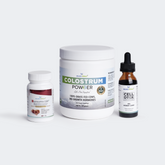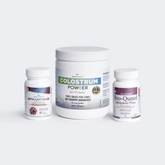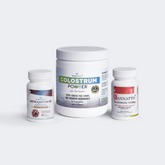How Much Biotin To Take Daily For Hair Growth? The Ultimate Guide
Estimated Reading Time: 10 minutes
|Struggling with thinning hair or slow-growing locks? You're not alone. Many turn to biotin supplements for hair growth, hoping for thicker, healthier hair; but does it actually work? And if so, how much biotin should you take daily?
Biotin, also known as vitamin H (H stands for Haar und Haut- German words for hair and skin), is a water-soluble B complex vitamin that supports keratin production. Keratin is a protein that forms your hair, skin, and nails. While biotin deficiency can lead to hair thinning, most people already get enough through a balanced diet.
Many people swear by biotin supplements for hair growth and preventing hair thinning. But the big question remains: How much biotin should I take daily to see results?
In this article, we will explore how biotin works, the optimal biotin daily dosage for hair growth, factors that affect your needs, natural sources, and potential risks associated with consuming an excessive amount of biotin. We’ll also talk about how to choose the right supplement safely.
What is the Role of Biotin in Hair Growth?
Wondering why your hair isn’t growing as fast as you’d like? Biotin (vitamin B7) is essential for our body to convert food into energy. It also aids in the production of keratin, a crucial protein that makes up our hair, nails, and skin. Research suggests that biotin deficiency can lead to hair thinning and loss.
Here’s how biotin contributes to stronger, healthier hair:
-
Supports keratin production: Keratin is the main structural protein in hair. Biotin ensures your hair follicles get the nutrients they need to function properly.
-
Prevents hair thinning in deficiency: Research shows that biotin supplementation improves hair health, mainly in people who are deficient.
-
Boosts overall hair strength: Adequate biotin intake helps maintain hair thickness and reduces breakage.
If you already eat a balanced diet rich in eggs, nuts, and whole grains, you may be getting enough biotin. For others, supplements may help fill the gap.
NOTE: Because of the key role biotin plays in keratin production, it is often linked to hair growth. However, research suggests that biotin significantly improves hair in people with a deficiency.
What Factors Influence Biotin Requirements for Hair Growth?
Your biotin requirements aren’t the same as everyone else’s. Several lifestyle and health factors can affect how much biotin your body needs, or how well it absorbs it. Here is what affects your biotin needs:
1. Age & Health Status
As we age, our bodies absorb nutrients less efficiently, which can lead to lower levels of biotin. Older adults or people with certain chronic conditions may experience lower biotin absorption, impacting hair health.
2. Hormones & Gender Differences
Research suggests that men may need more biotin than women to maintain healthy hair growth. This is because men often have higher levels of DHT (dihydrotestosterone), a hormone that can block hair follicles and lead to hair loss. Biotin can help counteract the effects of DHT and promote hair growth.
3. Underlying Health Conditions
Certain health conditions like digestive disorders (IBS, Crohn's disease) and other gut disorders can interfere with nutrient absorption, including biotin. Individuals with these conditions may require higher biotin dosages to support healthy hair growth.
4. Pregnancy & Breastfeeding
During pregnancy and breastfeeding stages, your body’s nutrient demands naturally increase. This makes biotin especially important.
Understanding how these factors influence biotin requirements can help determine the optimal daily biotin dosage for stimulating hair growth and maintaining healthy hair.
5. Lifestyle Choices
Smoking and excessive alcohol use can reduce biotin levels in the body by interfering with nutrient absorption and metabolism. Over time, these habits may also weaken hair follicles and reduce overall scalp health, leading to dull or thinning hair.
6. Medication Use
Long-term use of certain antibiotics, anti-seizure drugs, or isotretinoin (commonly used for acne) can disrupt gut bacteria or alter biotin metabolism. This can lower the availability of biotin in the body, even if your diet is sufficient.
Did you know?
Your gut health plays a big role in nutrient absorption, including biotin.
Explore how to support your digestive system naturally in this blog: How to Improve My Digestion and Gut Health Naturally?
Are You Biotin Deficient?
While biotin deficiency is uncommon, when it does occur, it can directly affect your hair, skin, and nail health. These are the signs that may point to biotin deficiency:
-
Hair thinning or hair loss: One of the earliest signs of low biotin levels is increased hair shedding or slower hair growth.
-
Brittle nails: Nails may become weak, thin, or prone to breaking easily.
-
Skin irritation: Dryness or red, scaly rashes (especially around the eyes, mouth, and nose) can appear.
-
Fatigue or low mood: In more severe cases, deficiency can contribute to fatigue, depression, or tingling sensations in hands and feet.
Note: If you notice hair thinning or persistent fatigue, consult a healthcare professional before starting any supplement.
Have You Read: 10 Foods to Promote Hair Growth
How Much Biotin Should I Take for Hair Growth?
Recent studies show that high-dose biotin isn’t a guaranteed fix for hair growth in healthy individuals. Its benefits are mainly seen in people with biotin deficiency or certain genetic conditions that affect biotin metabolism.
Here’s what the research and expert guidance suggest:
-
Recommended Daily Intake (RDI): About 30 mcg per day for adults, which most people get from a balanced diet.
-
Supplement doses: Over-the-counter hair supplements often contain 2,500–5,000 mcg, but studies show these amounts aren’t proven to enhance hair growth in healthy individuals.
-
Therapeutic use: Higher doses are only used under medical supervision for confirmed biotin deficiency or rare metabolic disorders.
-
Safety caution: High-dose biotin can interfere with lab tests, including thyroid and heart panels, as noted by the FDA.
-
Timeframe for results: When effective (in deficiency), visible hair improvements usually take several months of consistent supplementation.
NOTE: For most adults without a deficiency, sticking close to the RDI and maintaining a nutrient-rich diet is enough for healthy hair. Always consult a healthcare professional before taking high-dose biotin supplements.
| How Much Biotin Should You Take?
✔ General Wellness: 30–100 mcg/day (from food sources) |
How to Take Biotin for Best Results
To get the most out of biotin supplementation, follow these evidence-based tips:
-
Take with meals: Biotin is water-soluble, but taking it with food can help reduce digestive discomfort.
-
Be consistent: Hair growth improvements take time. Even in cases of deficiency, it can take 2–6 months to notice visible results.
-
Follow recommended doses: Stick to doses suggested by your healthcare provider; more is not necessarily better.
-
Monitor for side effects: Watch for mild digestive changes or any unusual symptoms. Stop or adjust the dose under medical supervision if needed.
-
Combine with overall nutrient support: Hair health depends on more than biotin alone, adequate protein, vitamins, and minerals support optimal results.
Pro Tip: Maintain a regular supplementation schedule for consistent absorption and better hair growth outcomes.
What are the Natural Sources of Biotin?
Adding biotin-rich foods to your diet can support hair, skin, and nail health. Here are some of the best natural sources of biotin:
-
Eggs (especially yolks): High in protein and biotin. Cooking improves absorption.
-
Almonds & Peanuts: Packed with biotin, healthy fats, and protein for hair nourishment.
-
Salmon: Contains biotin and omega-3s to strengthen hair follicles.
-
Sweet Potatoes: Rich in biotin, fiber, and antioxidants.
-
Spinach & Broccoli: Plant-based sources of biotin plus iron and magnesium.
-
Avocados: Provide biotin and healthy fats for strong, healthy hair.
-
Bananas: Smaller amounts of biotin, but add valuable vitamins and minerals.
-
Cauliflower: Low-calorie source of biotin that can be added to many dishes.
-
Mushrooms (shiitake, maitake): Provide biotin and enhance overall nutrition.
|
Food Source |
Biotin Content (per 100g) |
|
Eggs |
10 mcg |
|
Almonds |
60 mcg |
|
Sweet Potatoes |
2.4 mcg |
|
Spinach |
0.5 mcg |
|
Avocados |
3 mcg |
|
Salmon |
5 mcg |
|
Peanuts |
17 mcg |
|
Bananas |
0.2 mcg |
|
Cauliflower |
0.4 mcg |
|
Mushrooms |
7 mcg |
Tip: Incorporate a variety of these foods daily to naturally maintain healthy biotin levels and support hair growth.
How to Choose the Right Biotin Supplement?
If you’re considering a biotin supplement for hair growth, here’s how to pick the most effective and safe option:
1. Check the Biotin Dosage: For hair support, most supplements range from 500–5,000 mcg per day, with 2,500 mcg being commonly used in practice. Avoid taking higher doses without medical supervision.
2. Start Low, Go Slow: Begin with the lowest effective dose and monitor your body’s response. Gradually adjust only if recommended by a healthcare professional.
3. Consult your doctor: A healthcare provider can assess your biotin levels, underlying deficiencies, and overall hair health before you start supplementation.
4. Choose a trusted brand: Look for third-party testing, clean ingredient labels, and minimal fillers or additives. Avoid products with artificial colors or unnecessary additives.
Tip: High-dose biotin can interfere with certain lab tests (thyroid, heart, hormone panels). Always inform your doctor if you’re taking supplements.
Potential Side Effects and Safety of Biotin Supplements
Biotin is generally safe since it’s a water-soluble vitamin, meaning excess amounts are usually excreted through urine. However, taking excessive amounts of biotin can occasionally lead to mild side effects.
As per research, excess levels of biotin in the body are rare, but very high doses may lead to
- Excessive thirst
-
Insomnia (trouble sleeping)
-
Frequent urination
-
Skin rashes
-
Stomach discomfort
Caution: People with certain underlying medical conditions like diabetes, or those who’re pregnant or breastfeeding, need to be careful. Stick to the recommended dose and consult a healthcare professional before supplementing biotin, especially if you have a medical condition or take other medications.
| FDA Advisory (Updated): The U.S. FDA continues to caution that biotin supplementation, especially at doses above 5,000 mcg, can distort blood test readings, sometimes masking serious conditions like heart attacks or thyroid disorders. |
Safety tips:
-
Stick to recommended dosages (around 30–100 mcg daily, unless otherwise advised).
-
Always inform your healthcare provider before lab tests or if you’re taking multiple supplements.
-
Pregnant or lactating women should only use biotin under medical guidance.
Conclusion
If you're looking to support healthier, stronger hair, knowing how much biotin to take daily can make a real difference. Research suggests that most adults benefit from around 2,500–5,000 mcg of biotin per day, though individual needs may vary.
Pairing a balanced diet with biotin-rich foods and a trusted, third-party-tested supplement can help maintain optimal nutrient levels for overall hair and scalp health.
Always consult your healthcare provider before starting or changing any supplement routine, especially if you’re already taking other medications or have underlying health conditions. Stay patient, stay consistent, and focus on nourishing your hair from within, because true results come with time and care.
Disclaimer: This blog is for informational purposes only and does not provide medical advice. Always consult a healthcare professional before making changes to your diet or health routine. Individual results may vary.
Frequently Asked Questions
Q1. Does biotin really help with hair growth?
Biotin supports keratin production, a key protein that strengthens hair, skin, and nails. However, clinical studies show that it’s mainly effective if you have a biotin deficiency. For individuals with normal levels, its benefits may be limited.
Q2. How long does it take for biotin to show results?
Most people notice visible improvements in 2 to 6 months of consistent use. Hair growth is a slow process, and results vary based on your diet, overall health, and underlying deficiencies.
Q3. Can too much biotin cause hair loss?
No evidence suggests that high biotin levels cause hair loss directly. However, very high doses may trigger hormonal imbalances or acne, and can interfere with lab test results, which is why it’s important to stay within safe limits.
Q4. Is it better to take biotin in the morning or at night?
Biotin can be taken at any time of day, but taking it with a meal helps improve absorption and prevent stomach discomfort. The key is consistency, taking it around the same time daily.
Q5. What’s the best biotin dosage for hair growth?
Most studies and experts suggest 2,500 mcg per day for adults looking to support hair health. Higher doses should only be taken under medical supervision, as more isn’t necessarily better.
References:
-
Van De Walle, Gavin, and Tess Catlett. "Biotin for Hair Growth: Does It Work?" Healthline, 15 Mar. 2023, www.healthline.com/health/biotin-hair-growth.
-
Bergfeld, Wilma, MD. "Does Biotin Really Work for Hair Growth?" Cleveland Clinic Health Essentials, 29 Apr. 2022, health.clevelandclinic.org/is-biotin-as-good-as-advertised-for-your-hair-loss/.
-
Chen, Xiao, et al. "Influence of Biotin Intervention on Glycemic Control and Lipid Profile in Patients with Type 2 Diabetes Mellitus: A Systematic Review and Meta-Analysis." Nutrients, vol. 15, no. 2, 2023, https://www.ncbi.nlm.nih.gov/pmc/articles/PMC9659605/.
-
U.S. Food and Drug Administration. “Biotin Interference with Troponin and Other Laboratory Tests.” FDA, 2025, www.fda.gov/medical-devices/in-vitro-diagnostics/biotin-interference-troponin-lab-tests-assays-subject-biotin-interference
-
Office of Dietary Supplements. Biotin: Fact Sheet for Health Professionals. U.S. Department of Health and Human Services, National Institutes of Health, 10 Jan. 2022, ods.od.nih.gov/factsheets/Biotin-HealthProfessional/.
-
Bistas, Karlyle G., and Prasanna Tadi. “Biotin.” StatPearls [Internet], StatPearls Publishing, updated 3 July 2023, www.ncbi.nlm.nih.gov/books/NBK554493/




































